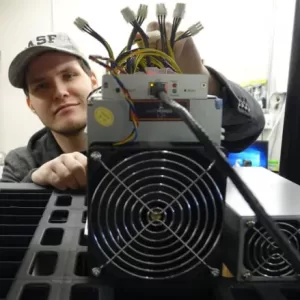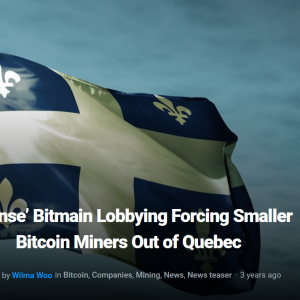D-Central aux nouvelles
Jetez un œil aux différents médias qui parlent de nous !
Nous avons rassemblé des articles du monde entier qui mentionnent d-central.
Entreprendre dans la crypto au Québec demande des sacrifices
LES CLÉS DE LA CRYPTO est une rubrique qui décode patiemment l’univers de la cryptomonnaie et ses secousses boursières, industrielles et médiatiques. François Remy se donne pour mission d’identifier les entrepreneurs prometteurs, de décoder les progrès techniques et d’anticiper les impacts industriel et sociétal de cette monnaie numérique.
Quebec company highlights need for more regulation
As Bitcoin and other cryptocurrencies surged in value this fall, the top market regulator in the United States created a new unit to monitor this fast-growing but little understood corner of the financial world. Earlier this week, the Securities and Exchange Commission’s new cyber unit filed charges for the first time. Its target: a Quebec cryptocurrency company that was promising investors returns of 1,354 per cent in 29 days or less.
As Canada Scrutinizes ICOs, Quebec’s Cheap Power is Helping Bitcoin Miners
In a series of tweets June 28, D-Central founder Jonathan Bertrand claimed that due to conflicting interests and agendas at government level, as well as an “intense lobbying effort” from the world’s largest mining corporation Bitmain, had left smaller participants “completely stunned.” “I am a Quebecer and I want to develop and participate in my local economy, but it is getting harder and harder and it seems to me the only rational choice is to look elsewhere,” he wrote.Quebec is becoming a center for bitcoin mining due to the province’s low electricity costs and its cold winters. Jonathan Bertrand, who runs Technologies D-Central from a warehouse on the outskirts of Montreal in Quebec, Canada, has become the largest bitcoin miner in Quebec province. The company’s hangar includes 50 computers that mine bitcoin day and night, according to the CBC.
I want to be a bitcoin miner … what will my salary be?
Job: Bitcoin Miner
The Role: As a decentralized cryptocurrency, there is no state or other authority responsible for processing and verifying bitcoin transactions. Instead, bitcoin miners based around the world earn small sums for lending the computing power needed to complete these digital transactions.
Hydro-Québec réclame des tarifs «dissuasifs» pour la crypto
Hydro-Québec a introduit une demande auprès du «gendarme de l’énergie» pour appliquer un tarif dissuasif aux nouveaux projets de minage de cryptomonnaies. Établi provisoirement à 0,15 $ du kilowattheure (KWh), cela représente par rapport au tarif habituel une flambée de 200%. De quoi refroidir les ardeurs.
Should Crypto Regulations Protect Users or Profits?
It can be argued that the cryptocurrency industry has been around long enough that we are beginning to see the effects that varying degrees of regulation have on the industry. Unfortunately, the world has seen what happens when not enough regulation is applied, and in some places, we are beginning to see what happens when too much regulation is imposed on the crypto industry.
La ruée vers l’or : « Bitcoin est le nouvel or, et Québec est son Eldorado »
C’est hier soir, au sein d’une Blockhouse pleine à craquer, que s’est tenu un Meetup portant sur le thème du minage de Bitcoins. L’ouverture des portes se faisait à 18h, et dès 18h05 quasiment toutes les places assises étaient prises. La demande était telle, que l’événement s’est vu retransmis en direct (Live Stream) sur la chaîne YouTube « World Crypto Network » et cumule à ce jour plus de 2 800 vues.
En période de surplus d’électricité, pourquoi empêcher le développement des projets de chaînes de bloc ?
La technologie chaîne de blocs («blockchain») est actuellement prisée par de nombreux entrepreneurs dans des projets où on a besoin de tiers de confiance modernes. Le secteur bancaire, le domaine de la culture, le droit ou même les systèmes de votation seront bientôt transformés par cette «technologie de stockage et de transmission d’informations, transparente, sécurisée, et fonctionnant sans organe central de contrôle» (source).
Desliguem as luzes de natal! – Consumo Energético do Bitcoin em Perspectiva
Muitos dos críticos do Bitcoin ou do algoritmo Proof of Work utilizado na mineração alertam para o fato de que a criptomoeda é insustentável para o meio ambiente, possui uma pegada de carbono muito alta e que utiliza mais energia do que muitos países do mundo ou até mesmo estimam o custo energético de uma transação de Bitcoin em comparação com transações do serviço de processamento de pagamentos Visa.
Mineros canadienses temen cese de sus operaciones ante nuevo sistema de selección de Hydro-Québec
Mineros de criptomonedas de Québec (Canadá) manifestaron su preocupación ante el sistema de subastas cerradas que actualmente está utilizando la empresa eléctrica local Hydro-Québec para permitir las operaciones mineras en esa zona, el cual consideran que favorece sobre todo a la empresa minera china Bitmain.
Quebec need for more regulation, experts say.
As Bitcoin and other cryptocurrencies surged in value this fall, the top market regulator in the United States created a new unit to monitor this fast-growing but little understood corner of the financial world.
Earlier this week, the Securities and Exchange Commission’s new cyber unit filed charges for the first time. Its target: a Quebec cryptocurrency company that was promising investors returns of 1,354 per cent in 29 days or less.
Jonathan Bertrand, le président de technologies D-Central, a des ordinateurs chinois dans sa « mine » de bitcoins en banlieue de Montréal.
Ces appareils coûtent jusqu’à 3000 $ par unité. Ces cinquante machines n’ont ni écran ni clavier. Mais elles possèdent chacune des dizaines de microprocesseurs et deux gros ventilateurs qui produisent presque autant de bruit qu’un aspirateur.
Montreal entrepreneur banking on province’s largest bitcoin ‘mining’ operation
A young Quebec entrepreneur has quietly created the largest bitcoin-mining operation in the province and plans to expand this year. Jonathan Bertrand runs Technologies D-Central from a warehouse on the outskirts of Montreal. From outside, the hangar is inconspicuous. Inside, the noise is deafening — the sound of fans cooling the 50 computers running day and night, mining for bitcoin.
Entrevue avec Salto Conseil – Mineur de Bitcoin
Nous rencontrons Jonathan Bertrand, mineur de Bitcoin, pour en apprendre un peu plus sur le concept des cryptomonnaies, le fonctionnement de son industrie, ainsi que sur son quotidien professionnel. Malgré le moratoire d’Hydro-Québec sur les demandes d’approvisionnement en électricité du secteur des cryptomonnaies, cette industrie est toujours bien vivante au Québec. Écoutez cette discussion éclairante avec l’un de ses leaders.
‘Intense’ Bitmain Lobbying Forcing Smaller Bitcoin Miners Out of Quebec
In a series of tweets June 28, D-Central founder Jonathan Bertrand claimed that due to conflicting interests and agendas at government level, as well as an “intense lobbying effort” from the world’s largest mining corporation Bitmain, had left smaller participants “completely stunned.” “I am a Quebecer and I want to develop and participate in my local economy, but it is getting harder and harder and it seems to me the only rational choice is to look elsewhere,” he wrote.





















